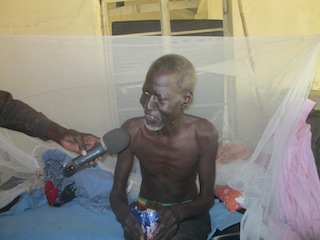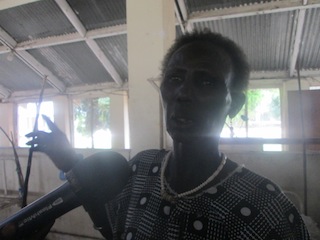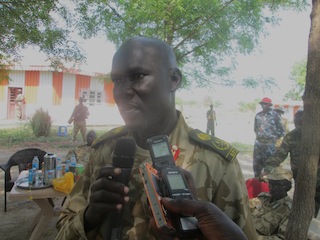Bor survivors tell of seeing people being raped, killed
January 23, 2014 (JUBA) – As the South Sudanese government and rebels signed a peace deal in the Ethiopian capital, Addis Ababa on Thursday, the people affected by the fighting are still struggling to come to terms with the destruction and violence of the last five weeks.

Ayor Garang, 63, was admitted to Bor hospital for back pain in November 2013 but says he was forced to beg rebel soldiers not to kill him while they occupied the town over the last three weeks.
“They (rebels) asked me: ‘Are you a supporter of Kuol Manyang [South Sudan’s defense minister and former governor of Jonglei]?’ but I said I am [an] Upper Nile citizen,” Garang said, recalling a conversation he had repeatedly with rebels while they controlled the town.
Other patients were not so lucky.
When Sudan Tribune visited Bor hospital corpses were scattered across the hospital wards and compound. In a small room, bodies of children had been dumped.
Garang, who lost his sight in 2002, said he knew the adults who had been killed as they had been fellow patients but did know where the children had come from.
“Two of them where sleeping near my bed,” he said of bodies of two men in the hospital compound. He remembers them as Garang and Hussein. The late Garang, he says, had one leg amputated and thought he would not be killed.
“Because I am blind, they are the one who brought for me food and water. After they were shot here” he said, pointing to the bed next to his. “I have to eat biscuits and drink water that they left near me.”

“I told them to kill me instead because I can’t have sex with children,” she recalls.
“Thanks to God, they left me but other younger women were raped. They had to run to UNMISS afterwards,” said Yar.
The two elderly patients appear to be the only patients that survived. Some patients starved to death, while others were shot and killed in their beds.
Bor’s residential areas remain dangerous, the army claims, as some rebels might be still be in hiding fours days after the military regained control of the town.
The market on the outskirts of Bor has been reduced to rubble.
A group of MPs who visited Bor with Sudan Tribune said that 2,500 people have been killed in Bor, based on reports from community leaders.
James Nhial, an armed civilian who visited Bor after government troops retook the town on Saturday, said there are many bodies.
“You see the birds,” he told Sudan Tribune pointing north of Bor where he passed while coming from Baidit Payam [district].
“I don’t what the government is doing! They should collect the people and bury them,” he said.
“It is poisonous to smell decaying bodies,” he said.
Government troops that recaptured the town for the second since the conflict began said they are overwhelmed.

“Yesterday, we buried many bodies. We started collecting from [the] hospital, market and the main road,” Dor told reporters on Tuesday in Bor.
“The soldiers are pursuing the enemy and the force left behind here cannot do everything in a day,” he said.
Malek Alier, a Member of Parliament representing Bor South in Juba, says the killing of civilians and burning of the market was planned before the attack on the town.
“I have been expecting it. This is a spirit of anarchy,” Malek told Sudan Tribune in Bor on Tuesday.
(ST)
